Cailee Spaeny: The Alien: Romulus Star Is Facing The Dark
With Alien: Romulus, Cailee Spaeny finds herself up against an iconic menagerie...

With Alien: Romulus, Cailee Spaeny finds herself up against an iconic menagerie of monsters. As she tells us, though, she's always been drawn to the dark.
Cailee Spaeny came out of nowhere, and suddenly she is everywhere.
Maybe she broke your heart in HBO’s Mare Of Easttown as the teenage mother lured into the woods to die. She was in Alex Garland’s philosophical sci-fi series Devs as tech genius Lyndon, and starred in Garland’s intense gut-punch of a film, Civil War. Most likely you will know her as the lead in Sofia Coppola’s Priscilla, which earned her a Golden Globe nomination: she was the actor brave enough to take on a role that would not only be heavily scrutinised, but would also require her to apply cat-eyeliner, in one take, without a mirror (trust us, this is an impossible task — awards should be given for this alone). Her characters are memorable because they exist at the extremes of human experience, enduring tough, complicated lives.
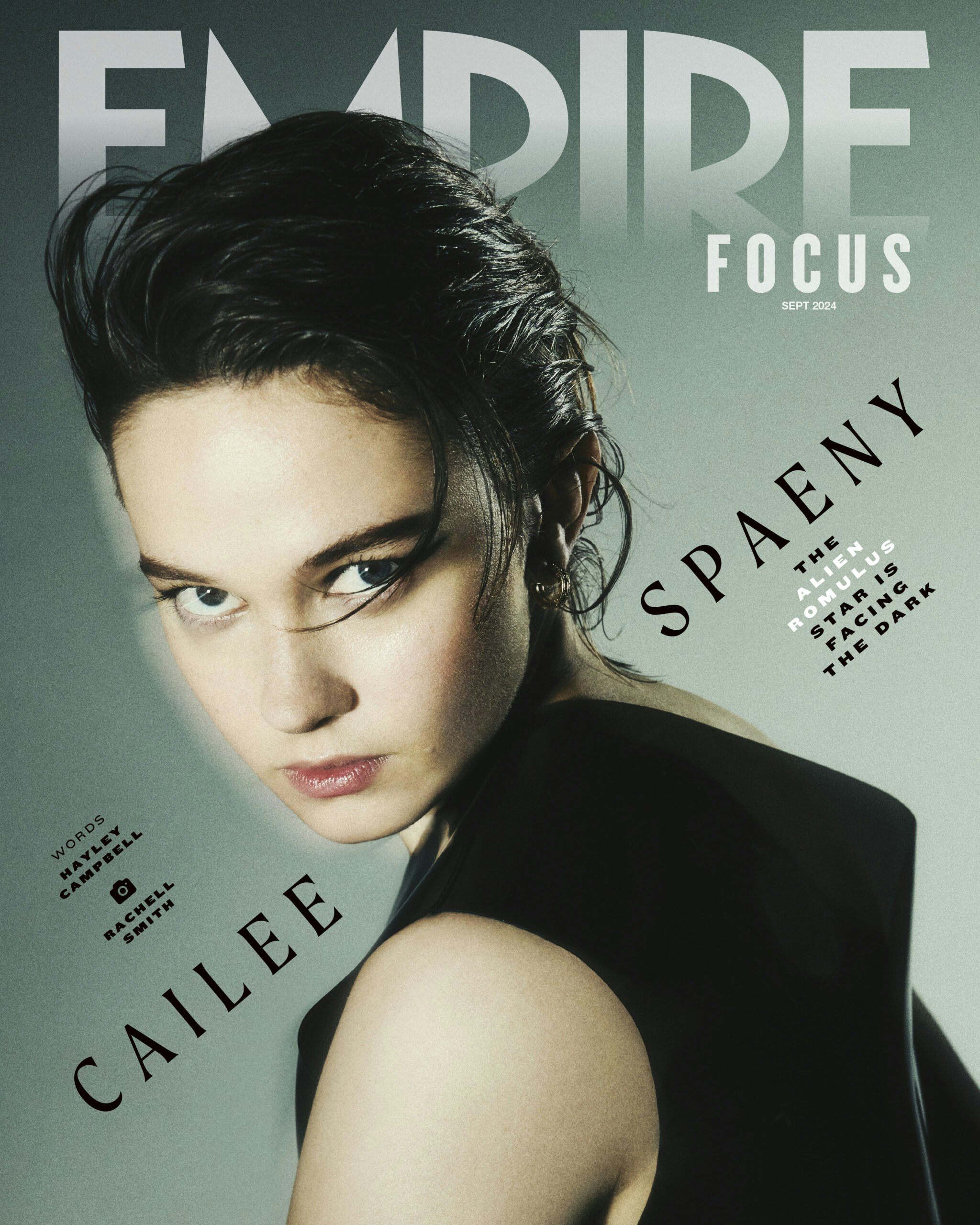
Spaeny left school in Missouri at 13 to pursue a career in acting. Her parents were unsure what to do with their “rogue child” but they saw that she was determined, and her first feature role was at the age of 18 in Pacific Rim: Uprising, followed by Bad Times At The El Royale, On The Basis Of Sex, and Vice. She is now graduating to more adult characters: soon we’ll see her step into Sigourney Weaver’s enormous space boots, playing the lead in Fede Alvarez’s Alien: Romulus, set in the time between Alien and Aliens.
The 25-year-old still has a determination that feels like a lit fuse: it’s unstoppable. You can see it as she contorts herself in front of the camera for the Empire photoshoot: chameleonic, powerful, occasionally bordering on the alien herself. She’s very involved in the shoot, suggesting things, changing things, hiking up her skirt to step over electrical cords to get a look at the monitor. Afterwards, we sat down with Spaeny to find out where she came from, and where this rocket is going.
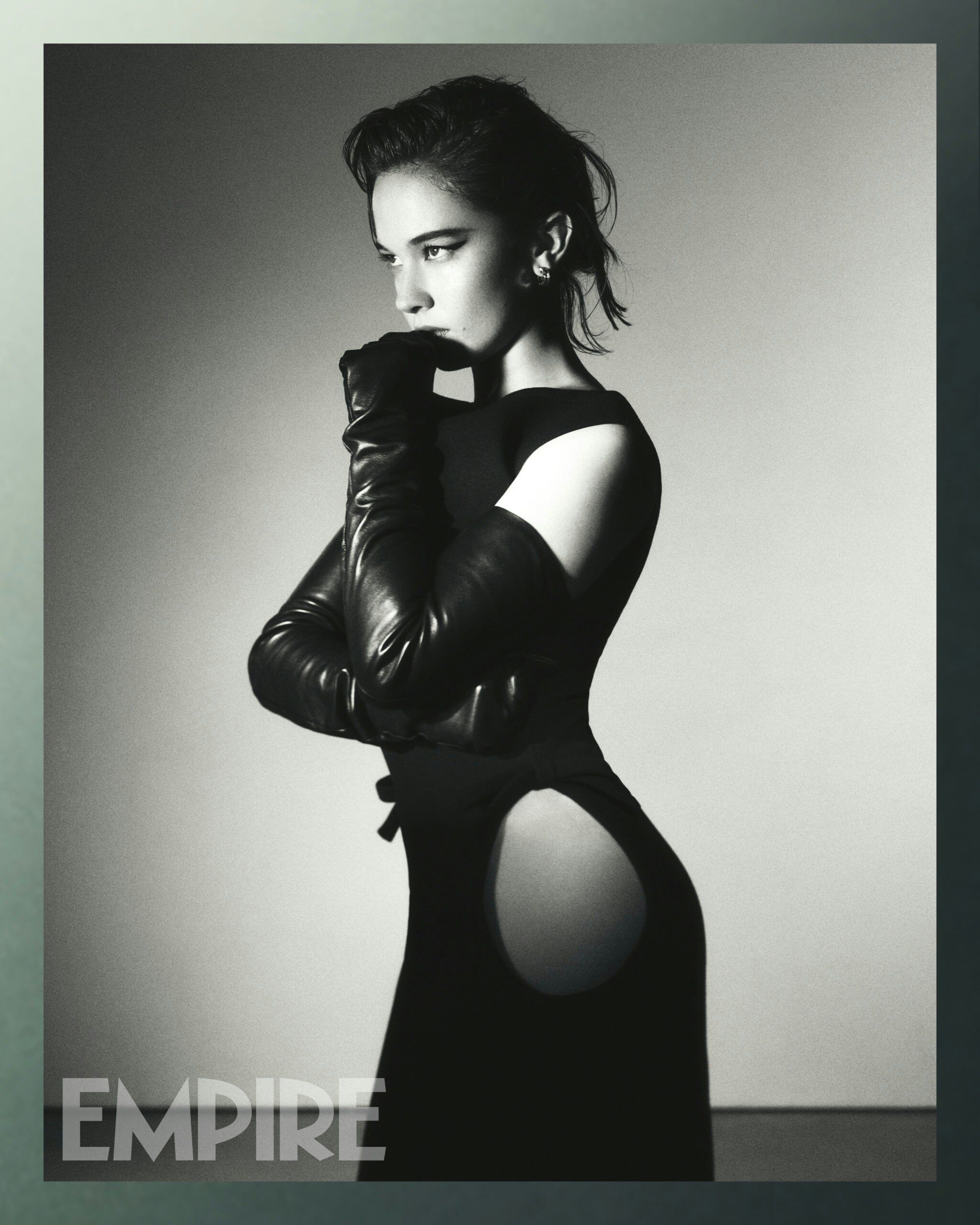
What did you do after you left school?
I spent a lot of time by myself in my room, trying to figure out what it is to be a good actor [by] watching movies.
Which movies?
Everything. I just wanted to know the difference between the subtleties of different genres, and what would make an ’80s action film work in terms of performance, or a small indie movie. That was my teacher. I didn’t go to an acting school. I just watched a lot of films and knew that if you flicked your head a certain way, or said a line in this way, it would get something across.
You’ve tended to play a young person thrust into the world of adults and then having to find a way to survive. Was that the case in real life too?
Yeah, that sounds like my life. I started working in a professional setting at 13, just surrounded by adults. My friends were 40-year-olds, who were like mums, or big sisters, or mentors. Then I got really bored with hanging out with kids my own age, which was a bit of a bummer because I wanted to have a normal social life, but I would be like, “Ugh, are we talking about this again? This is so boring — can we just talk about the theory of life and what the meaning of it all is?” (Laughs) I always wanted to be around people who were challenging me, or knew more than I did. I was always on a hunt to grow and learn.
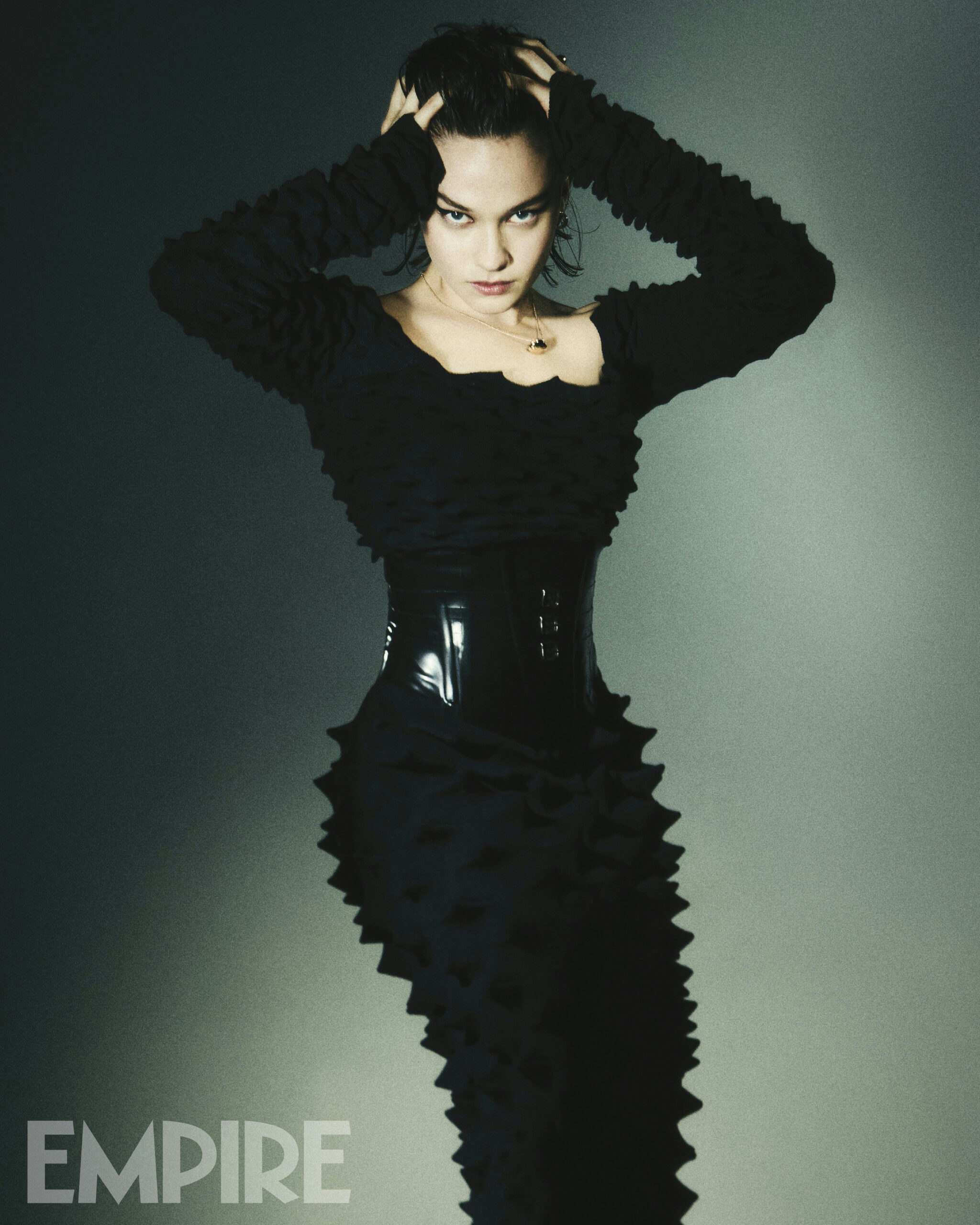
You sound hungry.
I’ve always been hungry. It’s a combination of arrogance or blind faith and also being absolutely terrified and insecure. But from a young age, for some reason I just knew. A lot of it was coming from a place of, “I need to get out of [Missouri].” That was the fuel, you know? And then you do, and you go, “Okay, what’s the next thing? Why are you actually doing this?”
The thing that drives you — do you know what that is?
I think I have to make it about my own personal challenges. Especially after Priscilla — I was more aware of the outside world and being perceived. But then I just have to centre it back to, “Okay, what’s gonna be challenging for me?” Going from Civil War to Priscilla, and then Alien: Romulus... those are completely different films in every way. I’m trying to flip it on its head all the time to keep things interesting.
"I got obsessed with how everything has to feel real, and drama was the best route to whatever I had in my mind."
You’ve worked with a lot of heavy material. Priscilla from the outside is beautiful — but it’s dark. Civil War is dark. Devs is dark. Mare Of Easttown is dark. Alien is–
(Laughs) I don’t know what that says about me.
Is this something that casting directors see in you, or are you seeking it out?
Actually, early on all I wanted to do was be on some sort of teen show, like Miley Cyrus. And I would go to auditions and they’d say, “Oh, you’re too dark.” I couldn’t do the big, funny, sitcom-y beats because I just made it too moody and angsty. I’d like to think I’m also light-hearted and don’t take things too seriously. But in music and film, I just gravitate towards whatever is the most dramatic or dark.
Why do you think that is?
I think I just got obsessed with what was real. As the girl who was locking herself in her room and watching films, I would sit in a coffee shop and see the way people move their hands and the way they interacted with the world and with other people. I got obsessed with how everything has to feel real, and drama was the best route to whatever I had in my mind. I think I was always a bit like that. Just the girl in the corner, maybe not the one you want to bring to parties.
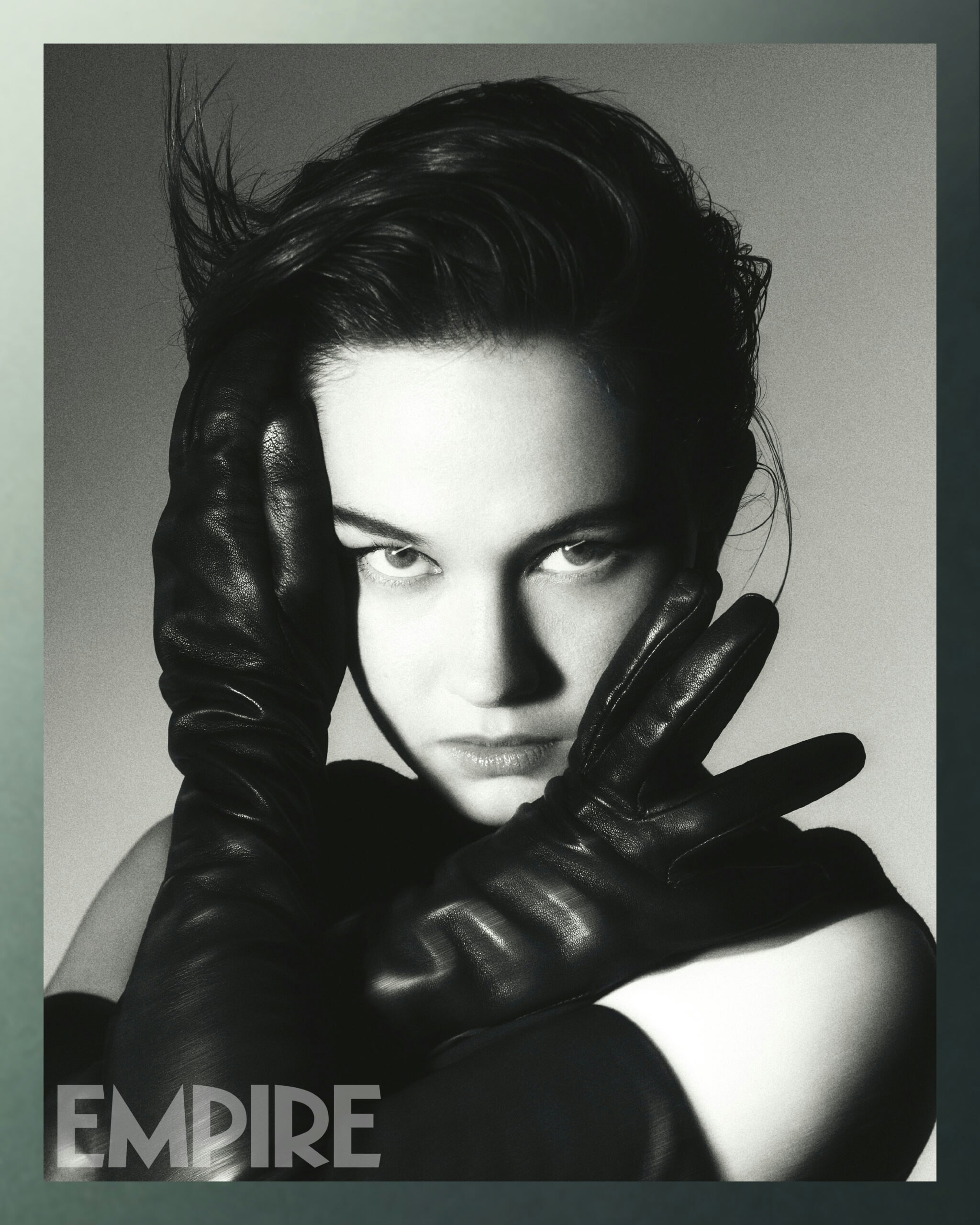
Speaking of the girl who got brought to parties, let’s talk about Priscilla. How did you come to star in that?
My first-ever callback was through Sofia. It was for [Coppola’s] The Little Mermaid, [which] ended up not getting made. I sent this weird self-tape, playing a mermaid with no dialogue. It was very strange and avant-garde. Then I auditioned for The Beguiled, and that didn’t end up working out. I was crushed, because Sofia is the director that I zeroed in on as a young teenage girl, especially living in the Bible Belt. There’s something so freeing [in her work] and something that wasn’t really talked about for young women where I grew up. She took young girls seriously. It really spoke to me on a personal level. Then I got a call that she wanted to meet me in New York. We had coffee, and then she pulled out her iPad and started showing me photos of Priscilla Presley.
At this point you were filming Civil War with Kirsten Dunst [who has worked extensively with Coppola]. Did she have a hand in your getting the role?
Yeah, I think she was watching me to see what she thought of me. I don’t know what she said to Sofia, but she said something, but then by the end of filming Civil War, I found out that I got the role of Priscilla. It’s pretty amazing to go through that whole process with Kirsten right by my side and getting to ask, “What is it like?” or, “What do I do?”
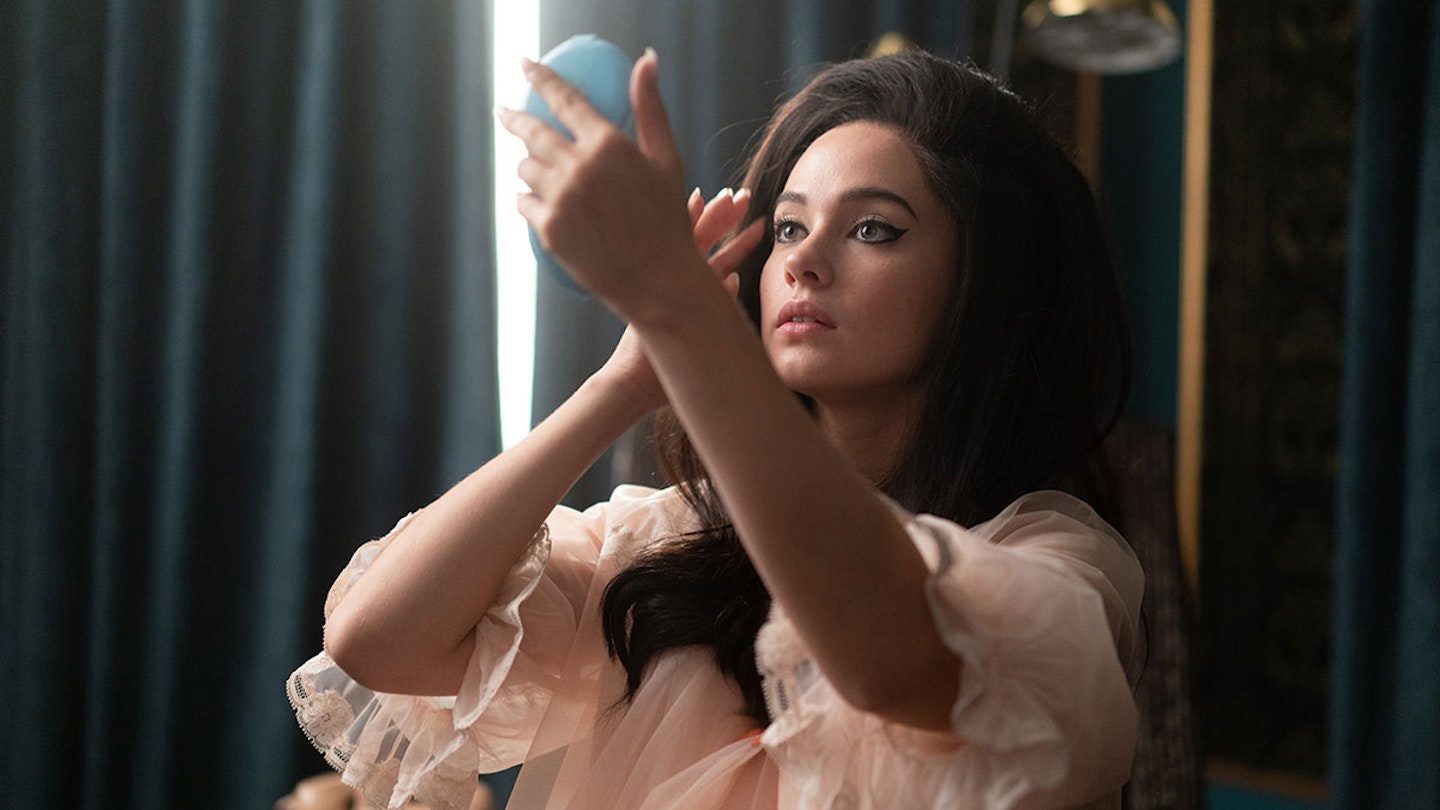
What did she say?
We’d just done this incredibly intense war film, with tons of explosions. It was very disorientating, and Kirsten was like, “[Priscilla] will be the opposite. It’s just so relaxed and chill, and you’re just going to have the best time and Sofia is going to be playing music and you’re going to be sad in the bathtub.” And all those things were right!
You met with Priscilla Presley in preparation for Priscilla. What was that like?
Surreal. I’d obviously read her book multiple times, and read all these articles and watched all these home videos. I had all these questions planned out, and then she walked into the room, and it all fell out of my brain [because I had] the real person who’s lived this life right in front of me. What was so interesting about telling that story is that we never wanted it to feel one-sided or good or bad. It had to sit in a weird, complicated grey area. Because, that’s how life is, you know? But it’s hard to transfer that onto film, and hard for people to accept that for some reason — even though we all have our strange, complicated lives.
"I want to just roll around. I want the blood, the sweat, the tears."
But that kind of abuse [from Elvis] within a relationship does exist in the grey area. That’s where it lives.
Yeah. She’s sitting in front of me, and she’s like, “I still love him. That’s just true.” And that was very apparent. So it was just being delicate, and trying to handle it with as much respect and grace as possible.
It’s an enormous amount of pressure. Were you nervous before she saw the film?
Oh my God, I can’t tell you how nervous I was! I thought I was gonna throw up or faint. I watched it [for the first time at the Venice Film Festival], but I was white-knuckling it the whole time. Jacob [Elordi, who played Elvis] was sitting right next to me, and then it was Priscilla. So I could see Priscilla the whole time in my peripheral vision, watching the movie. I kept turning to Jacob like, “I’m gonna leave, I’m gonna get up.” And then I was like: “I can’t walk past Priscilla and have her and all these people watch me leave the movie theatre!” So I just watched it. And then once the movie ended, she turned to me and she said, “You did it. That was my life.” It was a real relief.
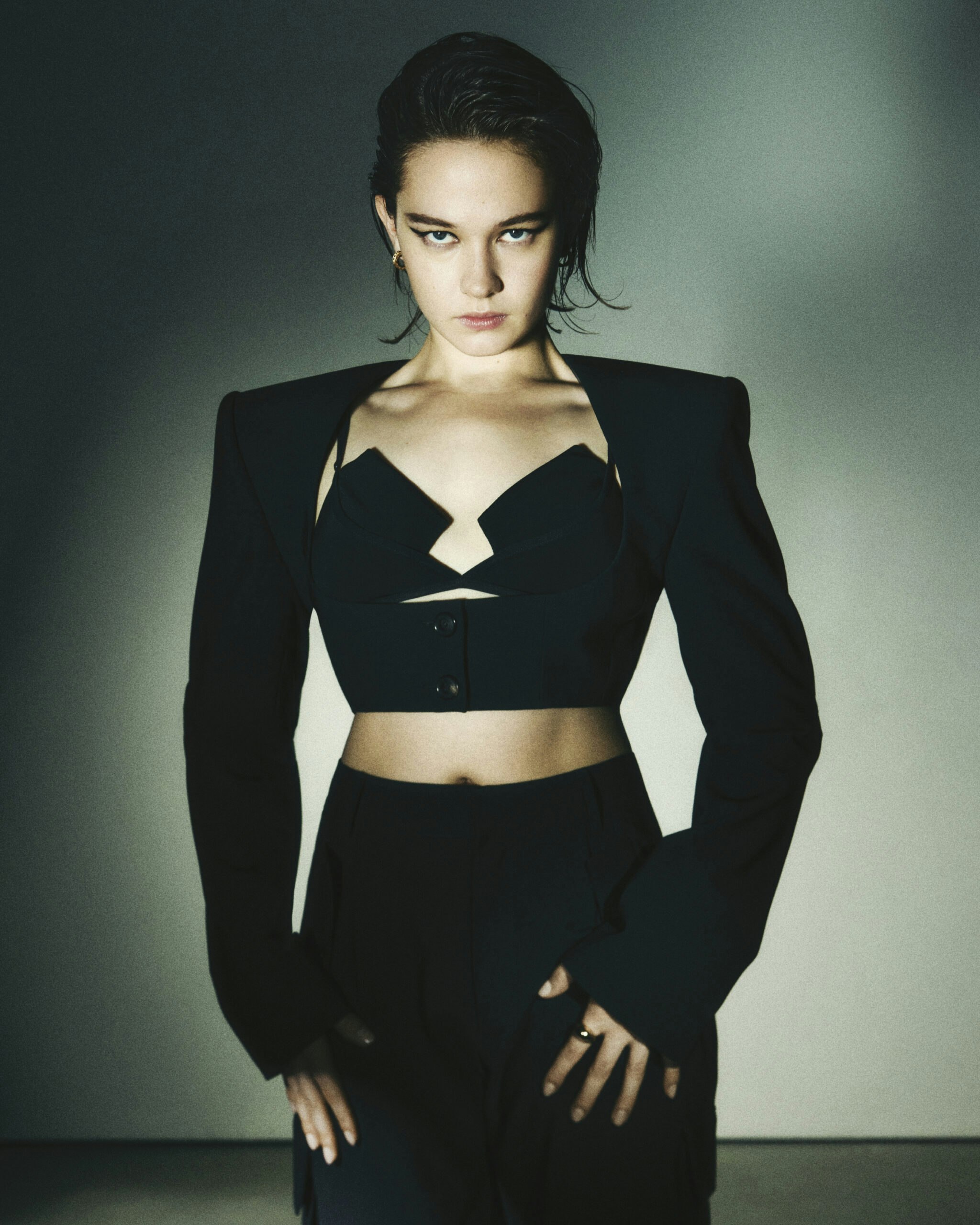
Something interesting about your work is not only how different each project is, but how you don’t seem to pick things based on vanity — you’re not afraid to get dirty. You’re crawling through a mass grave in Civil War, and in Devs you play a boy.
I find [glamour] boring. I mean, it was fun to dress up [in Priscilla] and I love doing these fun photoshoots, but I just find it uninteresting. I hope I never slide into that. And I don’t think it’s women’s fault when they get into that pattern of feeling like they’ve got to look a certain way — I think that’s completely understandable — but my favourite actors go completely against [that]. I’ve worked with Kate Winslet [in Mare Of Easttown] and she’s just fucking Kate. Heart on her sleeve, she is what she is. Those are the people that I look up to. Frances McDormand. I just want to see human beings. I think that’s what I want to create. To see someone who is real on screen is so satisfying.
Was your character in Devs always going to be a boy?
[Alex Garland] wrote the character as a boy, and was [auditioning] men for the role. And then at the last minute he told the casting director, “Let’s bring [in] some girls.” [The casting director] had seen a tape of mine for something that was a bit more androgynous, and brought me in, and he just went, “Yeah, it’s you.” And then I was like, “Okay, what am I doing with this?” And he was like, “You’re just playing a boy.” That was just that. He said it’s like how a lot of women play Peter Pan on stage — he just wanted something sort of boy-like, and wasn’t finding that in the men he was auditioning.
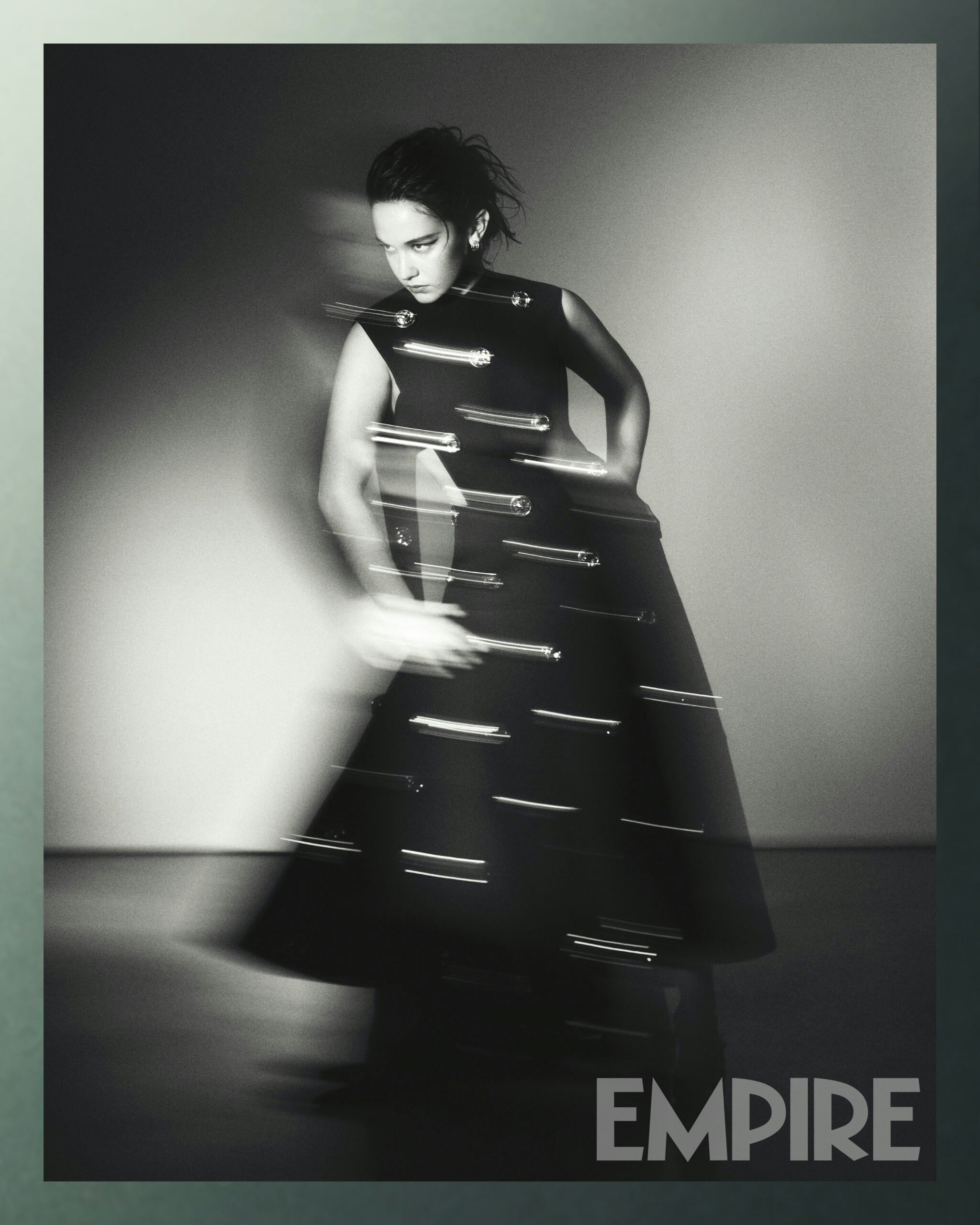
But it’s a fearless, unusual thing for an up-and-coming actor to do.
I just knew that I was gonna be safe. If it was any other director, I’d be like, “This is too weird.” But I knew Alex does things like that, and it just sort of works.
You worked with Garland again on Civil War. How much research did you do for playing a photojournalist? The film really celebrates what they do.
That was the thing that was so fun about prepping that role — getting to do proper research about those lives. Everything that makes up that kind of person, I don’t really have any of that in me, but I have so much respect.
Photojournalism is an intense job in****itself, but was working on Civil War emotionally intense?
I mean, I feel weird comparing it because sometimes I see actors go, “It’s like we’re in a war!” and I go, “Oh God, don’t say that!” But if we’re just comparing it to other films that I’ve done: yeah! It was very intense.
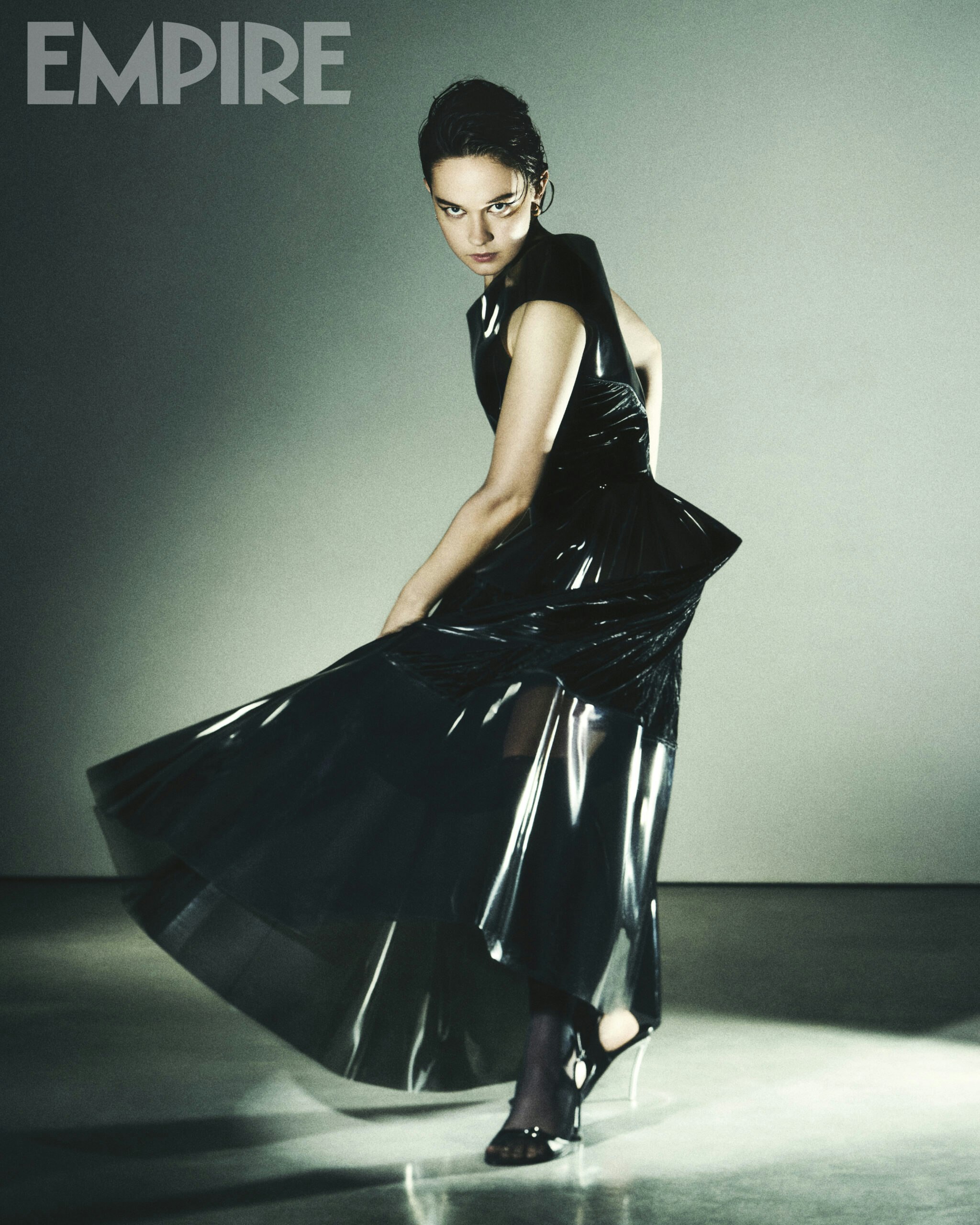
Which brings us to Alien: Romulus. Were you a fan of the movies before this?
I was, but I was really scared of horror when I was a kid. My first memory of Alien is my dad watching it in the living room and me thinking, “Oh, I’ll watch this.” And then once I got an idea of what it was going to be — once the chest- bursting scene came up — I went... (sharp intake of breath), “Oooh, no, I can’t,” and then ran down to my room. But I was still very curious, so I would come up and peek and then get scared again, run back down the stairs.
Fede Alvarez used old-school animatronics, so how was it to actually meet that alien****in real life?
The creature is so terrifying! Just the way [H.R.] Giger [designer of the original aliens] played with the human anatomy and the
sexual parts... ugh, there’s something really sort of primal. The second you see that creature, the hairs on the back of your neck stand up. And it’s still shocking. I’ve seen that creature so many times, and when it’s right there in your face, and we’re doing scenes where I’m acting against it — it’s still terrifying. The puppeteers were absolutely brilliant. I mean, they were really puppeteering these creatures. I just don’t think we see that anymore; we turned a corner where everything became green screens and acting to tennis balls. So it’s so nice to bring it back. I think you can feel it on screen. It was the same with the sets: all the sets were built. So that ship feels massive, because when we’re running down the hall, we’re not having to reuse hall space to keep running — those halls were there, and it was endless.
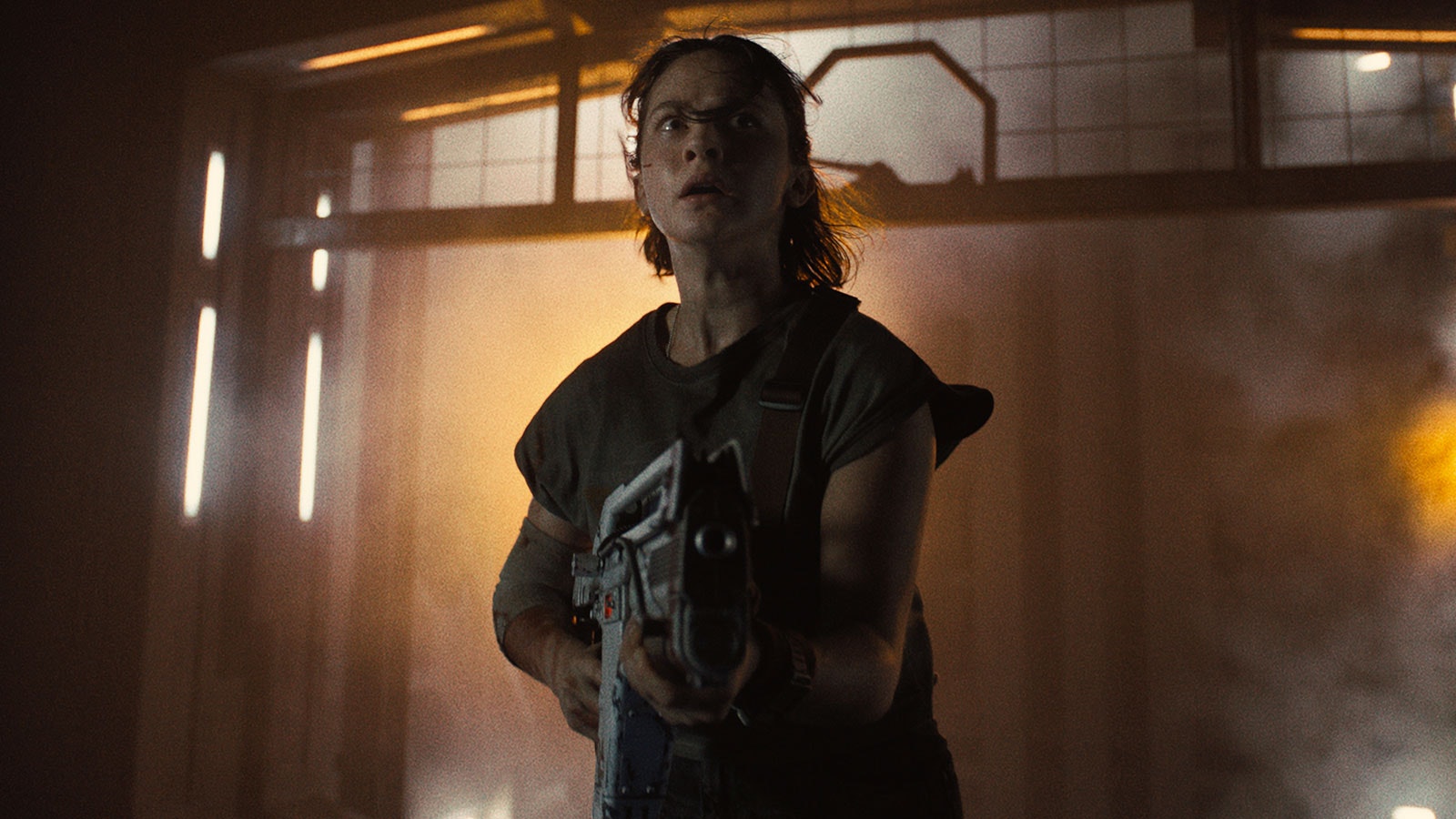
Obviously Alien comes with this huge history. You’re not actually playing Ripley, but did you feel the weight of all that, in taking on the kind of role that Sigourney Weaver made so memorable?
I absolutely love Sigourney in every way. [But] I took that all in and tried to do my own thing, because if you start going down, like, “How am I gonna fill those shoes?”, then you just won’t show up to work.
You probably burned yourself out on pressure with Priscilla.
Yeah! I think that’s probably what happened. I’ve got me, that’s all I’ve got.
Is this you stepping into more adult roles now, with Alien?
Hopefully! I think [Alien] was another reaction [to what came before]. [In Priscilla, I was] playing this delicate woman who was stifled the whole time, she’s in this gilded cage, and all I wanted to do was like... get in the dirt. I want to just roll around. I want the blood, the sweat, the tears. [I wanted to] let that all go and just be in it with Alien. That was just something I needed. It always feels like there’s some parallel between my life and the roles that I play. I think I need to move on. Find something else. I am growing up.
Alien: Romulus is in cinemas from 16 August.
Photography by Rachell Smith, shot exclusively for Empire in London.
What's Your Reaction?























